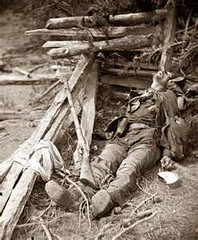
Ashley Wilkes; effete, tortured, loading with fear and self-loathing. And fascinating to me.
My head is a swimming blur of conflicting priorities. On one hand, I have William Ellis Jones, II, the Civil War Diarist and book publisher demanding that I “get back to original programming”. On the other hand I have his grandson, William Ellis Jones, III, and his dead daughter and his two living, but very tormented children, agitating for an expansion of the fiction “assignment” I produced for Mr. McNair.
I shipped McNair the deeply revised story (Is it a short story? Is it a novella? Is it a draft of a book I didn’t know wanted to be written?) yesterday – with tremendous trepidation.
I’ll tell you why I have trepidation. It isn’t about my weak verbs, or too many adjectives, or lulls in the prose, or even the fact that the damn thing is too long to be a short story and too short to be a novel. All those things can be resolved if the thing has any legs underneath it at all. My trepidation has to do with something that I have dealt with my whole life, and can’t do a damn thing about.
It’s about who I am, where and who I come from – and what that all means – in this case, to Mr. McNair as a person.
Yeah… yeah… yeah. I know I’m not making any sense.
I’ll spell it out for you.
McNair’s protagonist in Pickett (and I suspect Land O’ Goshen too, tho I have not read it yet), is an Alabama “cracker”; a man from the dirt-farmer class of southern folks who make fantastically tough, very colorful characters in modern literature. They’re just interesting to read and write about because they’re so damn uncivilized and irrational that they’re actually “novel”, in the original sense of the word.
When McNair and I first met, and I told him I was writing a bio of my g-g-g-grandfather, who fought in the Civil War, he instantly recommended a book for me to read. He said it was the best piece of autobiographical / historical prose he’d ever read, and it demonstrated near perfectly how to draw out a character and bring him to life.
That book is ‘All Over But The Shoutin’, by Rick Bragg. And I agree that it is incredibly well-written. It’s a great book about a whole lot of tragically broken, complicated, very colorful misfits.
But here’s the thing… Bragg’s misfits, like McNair’s protagonist, are of a “class” of Southern stereotypes that, while interesting, are about as remote from my experience and understanding as it gets (I could come up with a lot of nifty comparisons here, but that would just be trying too hard.)
Bragg, in his memoir, writes “White people had it hard and black people had it harder than that, because what are the table scraps of nothing? This was not the genteel and parochial South, where monied whites felt they owed some generations-old debt to their black neighbors because their great-great-grandfather owned their great-great-grandfather. No one I knew ever had a mammy.”
Well guess what? My own Mother (born 1936) had a Mammy. And her Daddy had a black wet-nurse. And both sides of my mother’s parentage descended from the “Plantation Class”. And I grew up with an overwhelming sense that we “…owed some generations-old debt to their black neighbors because their great-great-grandfather owned their great-great-grandfather…”, because the fact was that we knew every advantage we had (and even by the 21st century, there are still many) came at the expense of someone who our ancestors “owned”. I grew up understanding that my intelligence and ability to converse and move with ease through any social or business setting was literally stolen from the descendants of the people my ancestors enslaved.
I find the struggles and torments of the fallen southern aristocracy to be dark, often quite tragic, but more than anything else – complicated. And I’ll never be able to shed my fascination with the concept or the characters – because they are the people I know. They are, in fact, me, as well.
All that said, I wonder if Mr. McNair– given the characters and culture he knows best and who he respects – will be able to stomach reading about a somewhat effete, fallen aristocrat, who is full of self-loathing and guilt on so many levels that he can’t think his way out of his wet paper bag of pathos.
Looking at me and my characters from his (or better perhaps, from Rick Bragg’s point of view), we’re not a very sympathetic lot. We’re the people who built the system that stole every opportunity from everyone “below” us on the social ladder, and now that the ladder has upturned we’re sitting in the dirt feeling sorry for ourselves, trying to figure out what happened and where we went wrong. Pathetic really.
The reality is that we’ll probably never escape the class issues that define and divide us at least as much as the race issue. It makes me sad. I wonder whether this issue is enough to sink any hopes I might have had that McNair might actually help me become a better writer, and then do something with it.
I’m just hoping that all the above is just my own pathetic insecurity – and not what Mr. McNair actually sees in me or my work.
Maybe I just think too much.
 I’ve been quiet for weeks. While I have a moment I wanted to note that the quiet is not a result of slacking off. Rather, I’m working more hours at the bookshop, reading a great deal (thick into Rick Bragg’s “Ava’s Man” – fantastic book! Just finished Steven King’s memoir “On Writing”, last week, and about to pick up some Shelby Foote again as soon as I am done with my next Bragg book; “The Prince of Frogtown”.)
I’ve been quiet for weeks. While I have a moment I wanted to note that the quiet is not a result of slacking off. Rather, I’m working more hours at the bookshop, reading a great deal (thick into Rick Bragg’s “Ava’s Man” – fantastic book! Just finished Steven King’s memoir “On Writing”, last week, and about to pick up some Shelby Foote again as soon as I am done with my next Bragg book; “The Prince of Frogtown”.)












You must be logged in to post a comment.